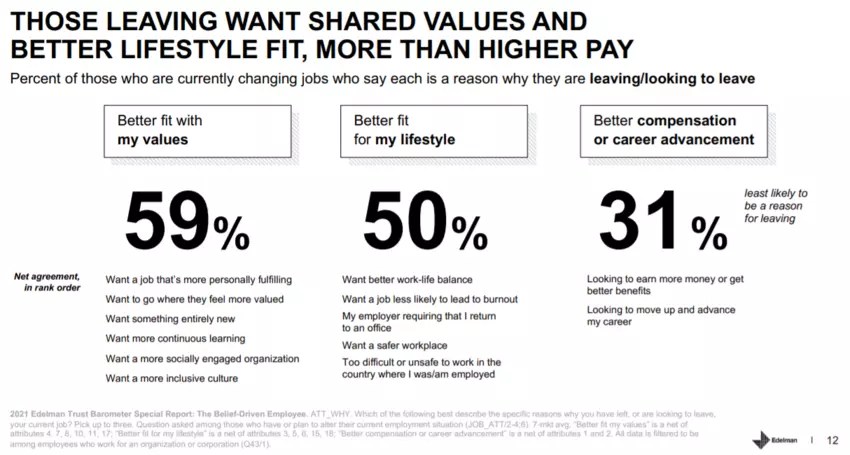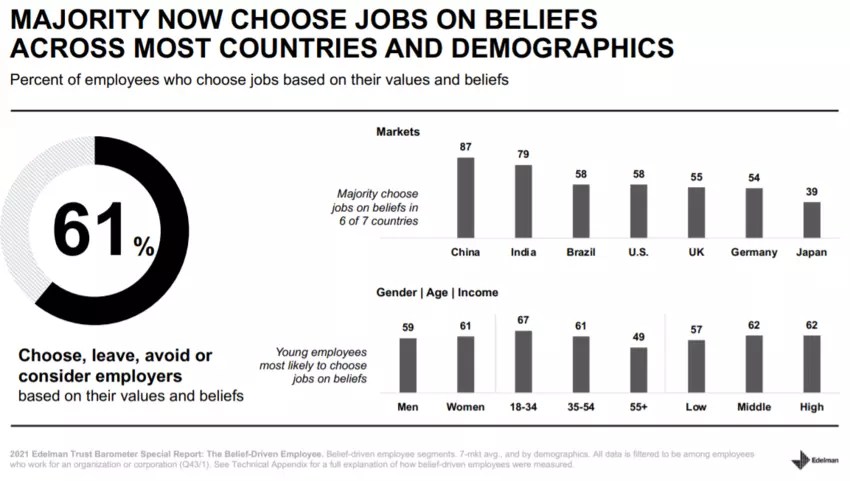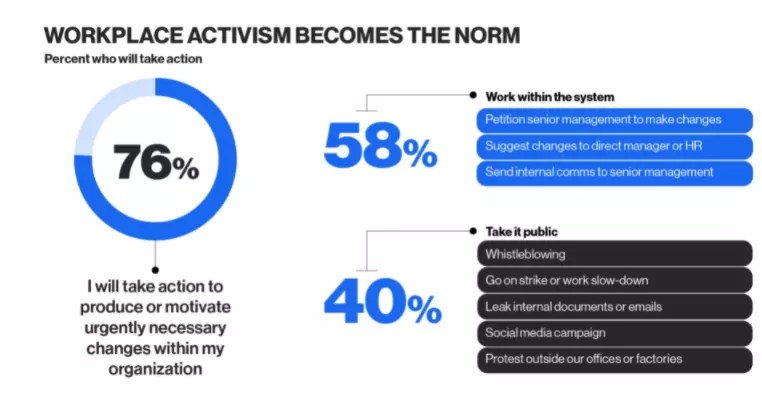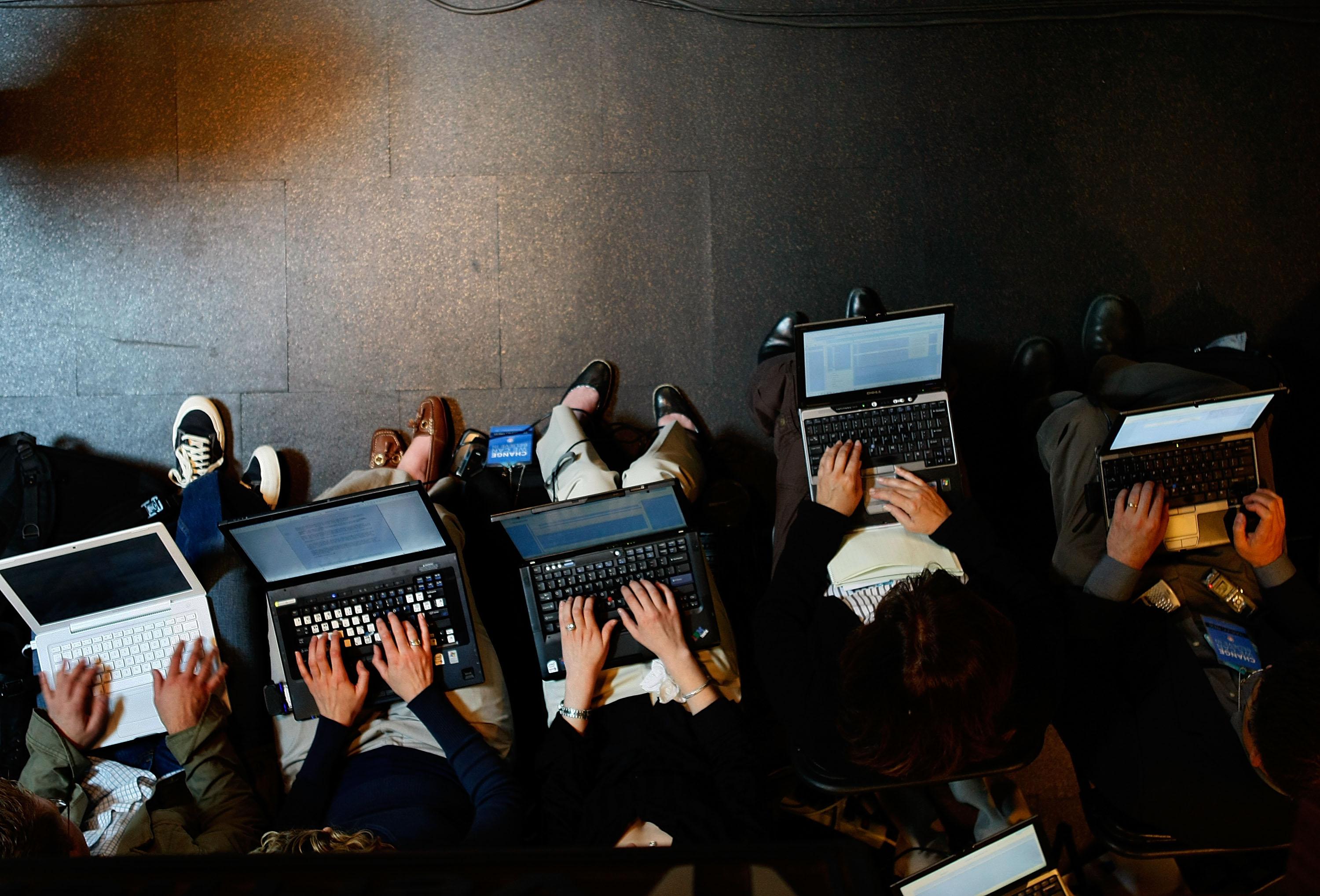The ‘belief-driven’ employee is the future of work

Do you work to live or live to work? Whatever your answer now – would it have been the same two years ago?
The impact of the pandemic has provided an inflection point for many. With the widespread shift from office to home working, the line between people’s personal and professional lives has become more blurred than ever. And this has made many reconsider their employment.
The outcome is a much more “belief-driven” employee, who is motivated not just by salaries and benefits, but also social impact and personal values.
This is the key finding of a special Edelman Trust Barometer report that considers the effect of the pandemic on employee motivation across seven global markets: Brazil, China, Germany, India, Japan, UK and the U.S.

Job movers seek a better fit between their own and their employer’s values
Although anxiety about job losses remains high at 78%, one in five workers surveyed had either left their previous jobs or were planning to do so in the next six months.
For some, this simply meant taking up a new role while others aimed to set up their own businesses or to retire.
Those moving on are driven by their beliefs and values more than considerations such as pay, benefits or career advancement.
Six in 10 respondents seek a better fit between their own and corporate values, beliefs and behaviours, ranging from being valued more to wanting to work for a more socially engaged or inclusive company.
For half of those moving jobs, lifestyle choices are a key motivator, including a better work-life balance, avoiding burn-out and not wishing to return to office-based working.
Less than a third named better compensation or career advancement as motives for quitting, making those the least likely of the reasons to leave.

The belief-driven employee
Selecting a new employer – or staying with an existing one – is similar to a consumer buying and remaining loyal to a brand, based on trust and alignment in values.
This includes employees refusing to work for companies with a different stance on social issues or in industries they consider immoral, and moving to firms with values more akin to their own.
This trend is consistent across the seven markets surveyed by Edelman, and particularly strong in India and China and among young and middle-aged workers.
Jobseekers increasingly want to see their prospective employers pursue a greater purpose. And seeing a company pay only lip service to social commitments and other proclaimed values can be a dealbreaker.
Alongside beliefs and values, there is also a strong emphasis on personal empowerment, such as the ability to provide input into the business. This reflects a decisive power shift towards employees, with 60% saying that employees in their organization have more power to effect change now than before the pandemic.
More than three-quarters stated that they would take action to get the organization to make changes. For most this is through internal employee activism, but 40% are prepared to take their cause outside the company, by going on strike, taking to social media or as whistleblowers.

Making the most of belief-driven employees
While employers need to be ready to deal with this new balance of power, it pays to keep belief-driven workers onside. The Edelman report finds them to be very loyal, remaining with the organization for many years, and they also recommend it to potential new hires.
What is more, a 2021 study from the University of Malta found a highly significant relationship between employees’ own and their companies’ motivations – including socially responsible practices – which is indirectly affecting the employees’ job performance.
Happy, fulfilled employees make for productive organizations.
Initiatives such as the World Economic Forum’s Preparing for the Future of Work initiative aim to help employers make the most of these trends in the wake of COVID-19 by encouraging reskilling and upskilling, smart redeployment of human capital and socially responsible action.
By bringing employers and employees closer together, the gap between living to work and working to live may be more easily resolved in future.
Republished with permission of the World Economic Forum. Read the original article.





